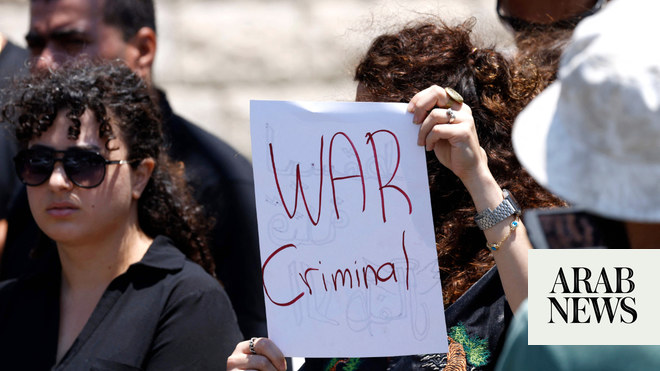Could the Majdal Shams football stadium tragedy spark a war between Israel and Hezbollah?
BEIRUT/DUBAI: Israel's security cabinet has authorized Prime Minister Benjamin Netanyahu and Defense Minister Yoav Gallant to respond to Saturday's rocket attack on a football stadium in the Druze Arab town of Majdal Shams in the Israeli-occupied Golan Heights that killed 12 children.
The town of Majdal Shams was hit by an Iranian-made Falaq-1 rocket carrying a 50-kilogram nuclear warhead, fired by the Iranian-backed Hezbollah militant group in Lebanon, according to the Israeli military, a conclusion supported by the United States.
Hezbollah, which has been exchanging fire across the border with Israel regularly since the Gaza war began on October 7, said it had “no involvement” in the incident but confirmed it had fired a rocket at an Israeli military target in the Golan on Saturday.
“Anti-Islam groups have nothing to do with the incident and we reject all false allegations,” the statement said, and blamed an Israeli interceptor missile for the failure to kill the dead.
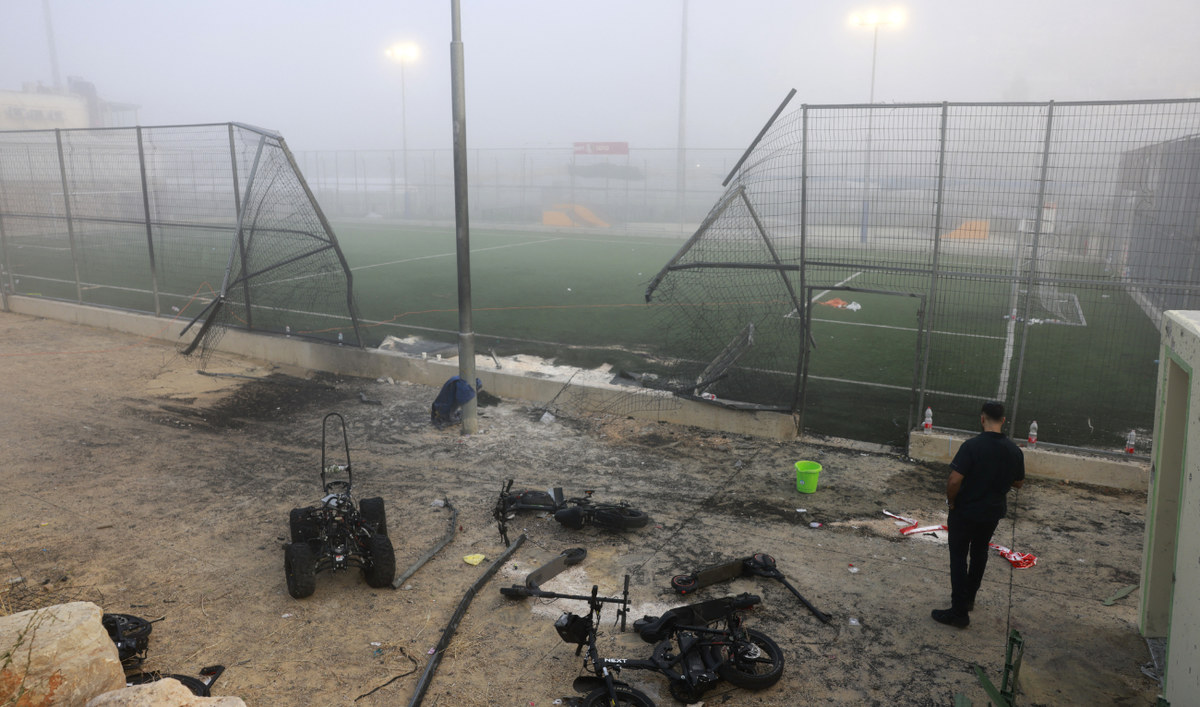
A man stands near a damaged gate around a football field after a Lebanese attack was reported on the village of Majdal Shams in the Israeli-annexed Golan Heights on July 28, 2024. (AFP)
The Majdal Shams incident came after an Israeli strike killed four Hezbollah militants in southern Lebanon, prompting the militant group to launch a retaliatory rocket attack on the Golan and northern Israel.
In a post on social media platform X, Mohanad Hage Ali, a senior fellow at the Carnegie Middle East Center in Beirut, said one possible scenario is that Hezbollah or one of its allies, such as the Fajr Forces and Al-Qassam Brigades, accidentally fired the rocket.
No matter what happens, “in every case, the massacre is a pretext for the Netanyahu government to respond with force,” he said.
Netanyahu, who had returned from an early visit to the United States, immediately joined a security cabinet meeting, telling local media that “Hezbollah will pay a very high price” for the attack, “a price that Hezbollah has never paid before.”
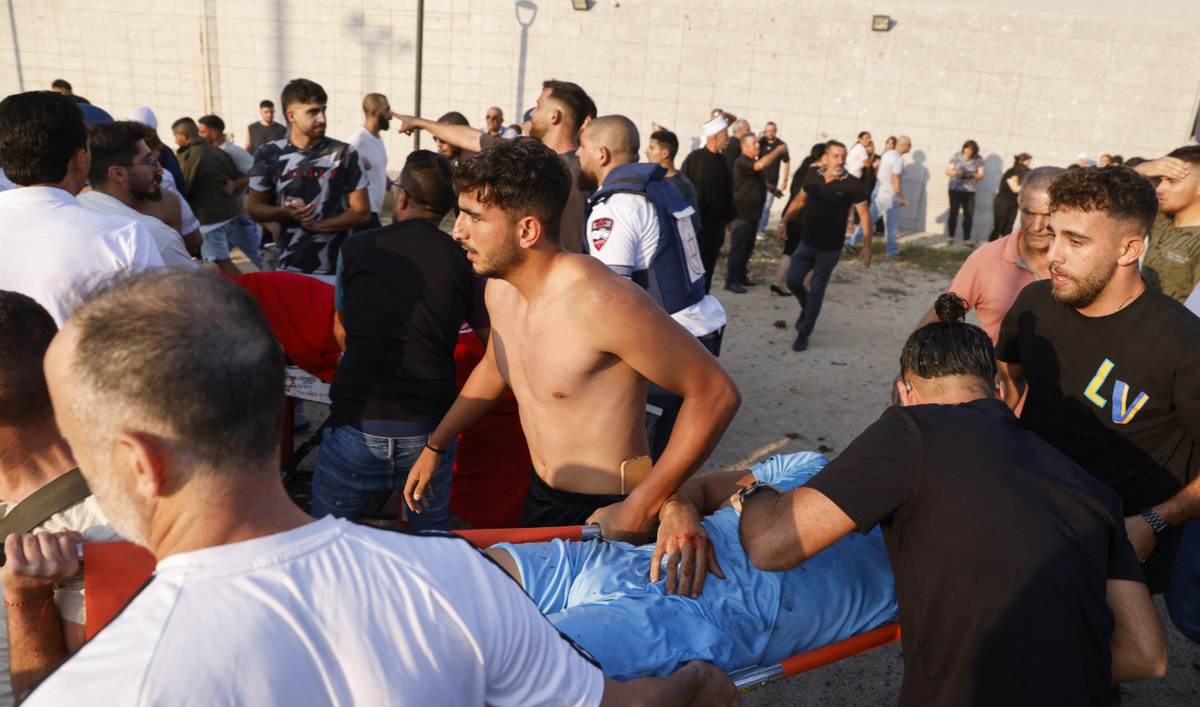
Israeli security forces and medics move injured people and civilians in the village of Majdal Shams in the Israeli-annexed Golan Heights on July 27, 2024. (AFP)
After the meeting, his office said, “Cabinet members authorized the prime minister and defense minister to decide on the form and timing of the response to the terrorist organization Hezbollah.”
During a visit to Majdal Shams on Sunday, Gallant pledged to “strike hard on the enemy,” raising fears that the war in Gaza could spread globally. Meanwhile, Iran warned Israel that any new military “adventures” in Lebanon could lead to “unintended consequences.”
The Israeli military has called it the “bloodiest attack on Israeli civilians” since cross-border clashes with Lebanon began in October, fueling fears that the limited fighting could escalate into a full-scale war.
Indeed, regional observers fear that any strong Israeli response to the attack could draw Hezbollah's Iranian backers into the fight.
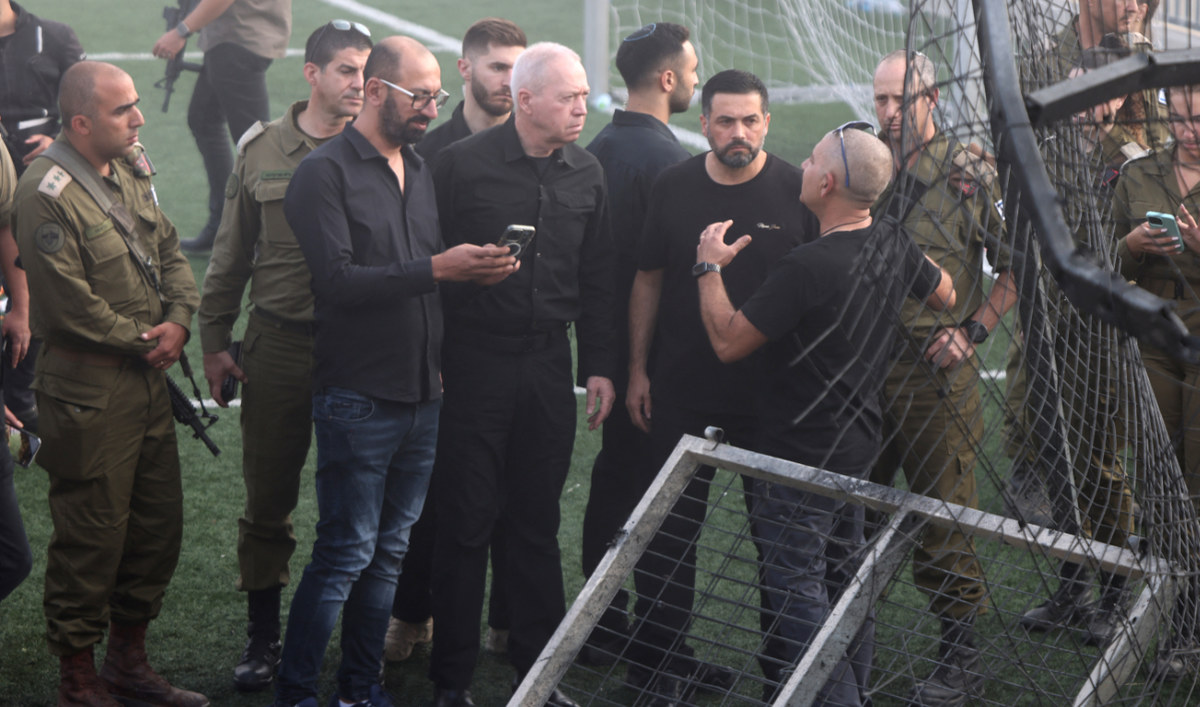
Israeli Defence Minister Yoav Gallant (C) visits the site of a reported Lebanese attack on the village of Majdal Shams in the Israeli-annexed Golan Heights on July 28, 2024. (AFP)
“A strong Israeli response to Hezbollah could prompt another direct Iranian response,” said Meir Javedanfar, an Iranian-born Israeli-born Middle East scholar and commentator after the rocket attack.
As with past violent retaliatory actions between Israel and its Iranian-backed adversaries since the outbreak of the Gaza war, the retaliatory actions were minor and carefully planned to maintain a deterrent effect without escalating into a violent confrontation.
However, Firas Maqsad, a senior fellow at the Middle East Institute in Washington, D.C., is not assuming the situation is dire. “The risk of another miscalculation is not very high,” he said.
“A broader Israel-Lebanon war has been in the works for a long time. The ‘positive’ scenario is that the impending offensive will be limited to the largely uninhabited areas of both countries.”
innumber
- 12 Children and teenagers were killed in a rocket attack on Majdal Shams in the Israeli-occupied Golan Heights on Saturday.
- 527 There have been at least 104 civilians killed on the Lebanese side of the border since the exchanges between Israel and Hezbollah began in October.
- 46 On the Israeli side, civilians and soldiers were killed, including 22 in the Golan Heights, according to the Israeli military.
Although the rocket attacks and subsequent Israeli retaliation created the conditions for a rapid escalation, Hage Ali of the Carnegie Middle East Center believes Hezbollah still wants to avoid a full-scale war.
“Hezbollah still wants to avoid war and will show patience after Israel’s response,” he said. “Even if Hezbollah crosses a red line, Hezbollah may choose to respond with a symbolic ‘check the box’ response.”
However, “the Majdal Shams attack underscores the challenge of maintaining a geographically confined conflict for months on end. Mistakes or miscalculations can happen and escalate into conflict, no matter how much the parties want to avoid it.”
Israel responded early Sunday with strikes on the southern Lebanese towns of Abbasiya and Burj al-Shamali. Both towns, which are adjacent to Tyre, sustained significant material damage. Further strikes were also launched on Tyre, Harfa and Kiyam.
The attack took place in Taraiya in central Bekaa with two missiles destroying a residential building. No injuries or deaths were reported.

Smoke billows from a spot targeted by the Israeli army in the southern Lebanon border village of Kafr Gila on July 29, 2024. (AFP)
“Nobody wants a big war,” Kim Ghattas, a Lebanese journalist based in Beirut who writes for The Atlantic, posted on X.
“Israel will attempt to strike major or highly visible targets within a single night of heavy bombardment, or within a week of the operation. It is important to avoid population centers/civilian casualties and not trigger a major Hezbollah response and a full-scale war.”
“This is a very difficult calibration to make. The risks are high for Lebanon, the region and the Biden administration. Israel has not yet called for additional evacuations of northern Israeli settlements, indicating that it believes Hezbollah’s response will be deliberate.
“All this requires open channels of communication to ensure that no one misreads the other’s moves. It’s like a death dance with real consequences for civilians everywhere.”
As tensions escalated over the weekend, several Western countries issued statements urging their citizens to avoid non-essential travel to Lebanon and Israel, while several airlines suspended flights to and from Beirut.
A flurry of diplomatic activity has taken place since the attacks to deter Israeli retaliation.
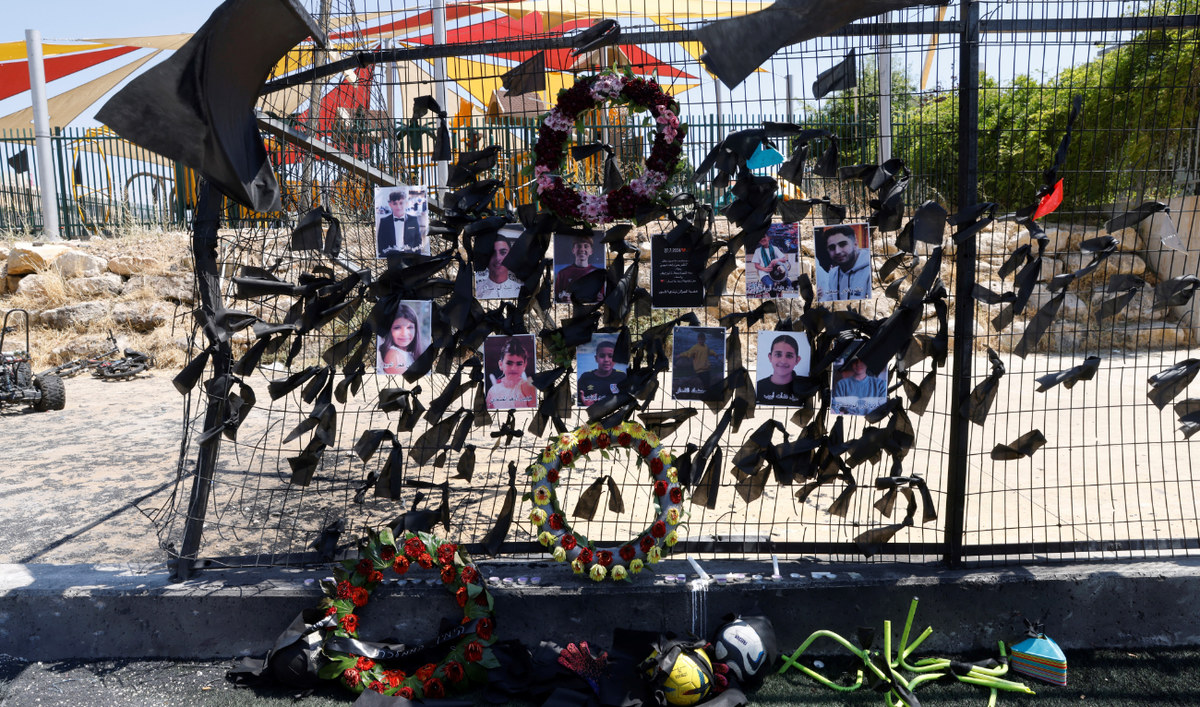
Photos of dead children and young people hang from the fence of a football field where a rocket fell in the village of Majdal Shams in the Israeli-annexed Golan Heights on July 29, 2024. (AFP)
The Lebanese government condemns all acts of violence and attacks on civilians, saying that “attacks on civilians are a grave violation of international law and contrary to the principles of humanity,” and calling for an “immediate cessation of hostilities on all fronts.”
Lebanese Foreign Minister Abdullah Bou Habib said the United States, France and other countries were working to contain the violence, in an interview with local radio station Al-Jadid on Sunday.
“Since the war began, Hezbollah has been attacking military installations, not civilian ones,” he said, adding that “he does not believe that Hezbollah carried out the attack on Majdal Shams this time.”
“It could be another organization’s fault, it could be Israel’s fault, it could be Hezbollah’s fault. I don’t know. We need an international investigation to find out the truth about this.”
Lebanese Prime Minister Najib Mikati also said “negotiations continue with international, European and Arab parties to protect Lebanon and prevent harm,” in a statement on Sunday.
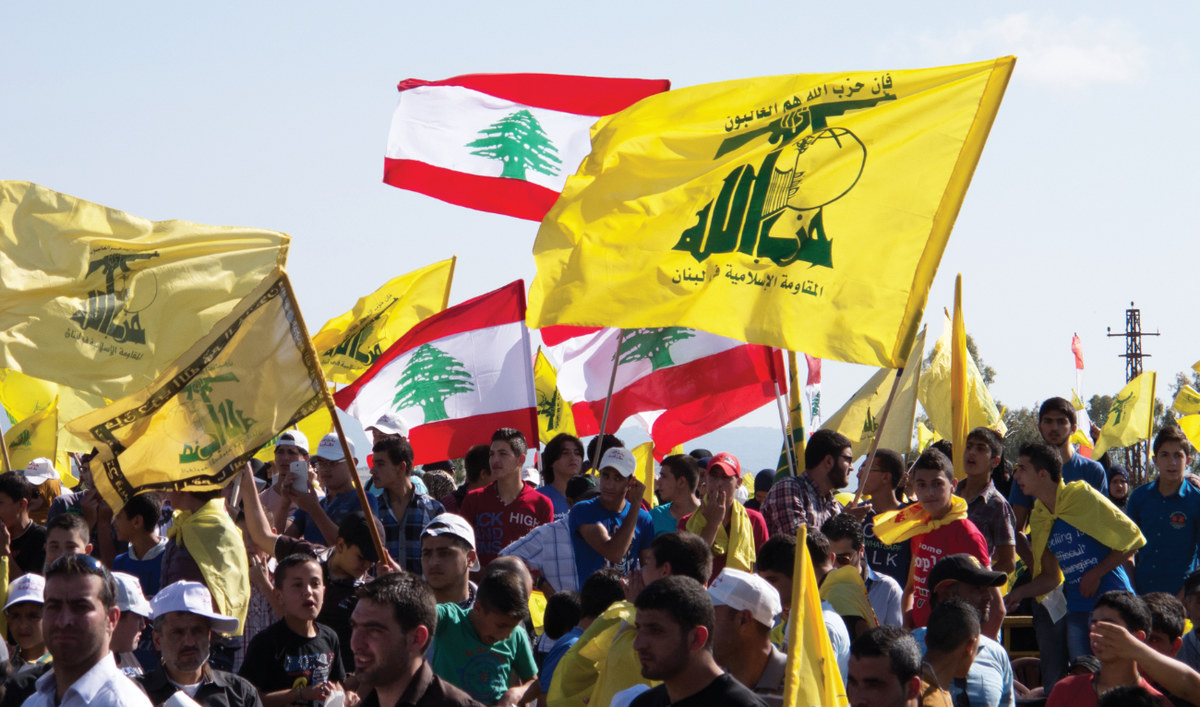
Hezbollah said it had “no involvement” in the Majdal Shams attack but confirmed it had fired the rocket at Israeli military targets in the Golan on Saturday. (Shutterstock)
US National Security Council spokeswoman Adrianne Watson said Washington has been in “continuous discussions” with Israel and Lebanon since the attacks.
UN Secretary-General Antonio Guterres condemned the rocket attack and called on all parties to “exercise maximum restraint”.
In a joint statement, Jeanine Hennis-Plaschert, the UN Special Coordinator for Lebanon, and Major General Aroldo Lazaro, the head of the UN Interim Force in Lebanon, stressed that “civilians must be protected at all times.”
They called on “all parties to exercise utmost restraint and cease the violent and persistent clashes that could trigger a wider conflict and plunge the entire region into unimaginable disaster.”
Hennis-Plaschert said she had been in contact with Lebanese parliament speaker Nabih Berri, who is a key communication channel with Hezbollah.
In his own statement, Berri said: “Lebanon and the opposition (Hezbollah) adhere to Resolution 1701 and the Code of Conduct not to target civilians,” stressing that the opposition’s “denial of the events in Majdal Shams is a clear confirmation of this commitment, and that Lebanon and the opposition are not responsible for what happened.”
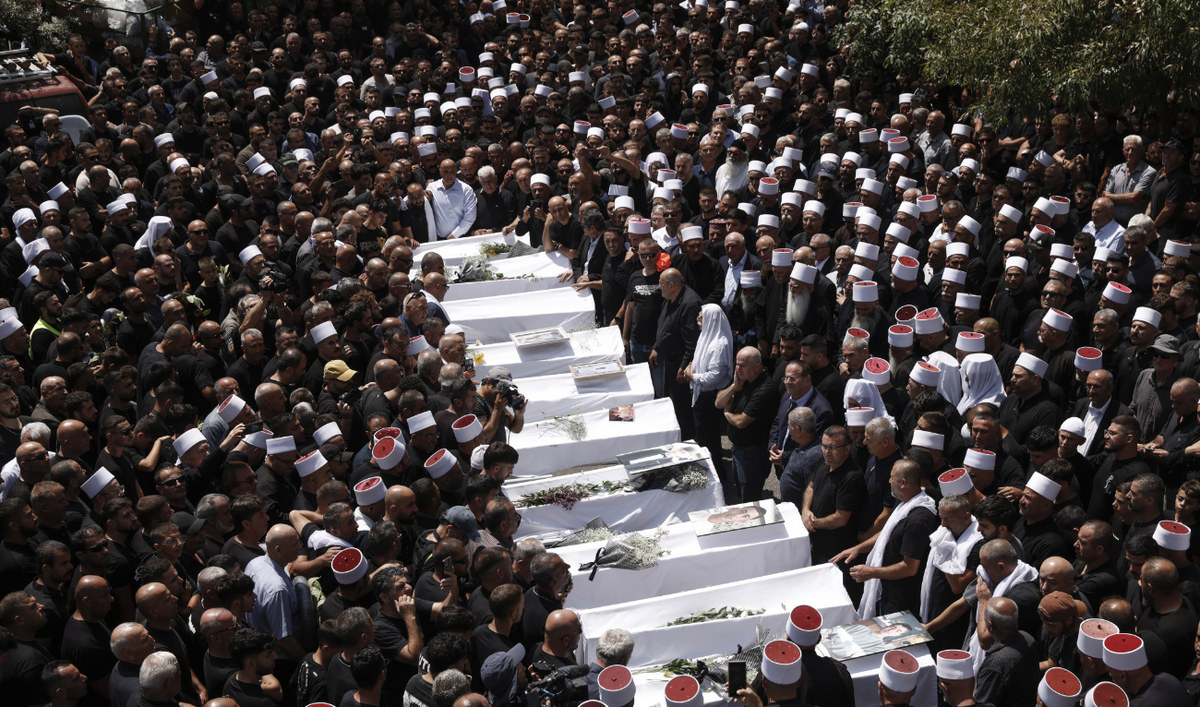
Mourners surround the coffins of 10 of the 12 victims killed in Majdal Shams during a mass funeral in the Israeli-annexed Golan Heights on July 28, 2024. (AFP)
Walid Jumblatt, a former leader of the influential Druze-based Progressive Socialist Party, said he received a call on Saturday night from US President Joe Biden's special envoy, Amos Hochstein, to discuss the incident.
Jumblatt called on both sides to exercise restraint and remain calm, stressing the need to avoid civilian casualties. “No matter where it occurs, attacks on civilians, whether in occupied Palestine, the occupied Golan or in southern Lebanon, are unacceptable,” he said in a statement.
The fact that the deceased in the Majdal Shams attack was not an Israeli but a member of the Druze community is a complicating factor for Hezbollah, which has been trying to improve relations with the religious sect.
Many people in Majdal Shams have refused to accept Israeli citizenship since Israel seized the Golan Heights from Syria in 1967.
After conquering about two-thirds of the Golan Heights in the 1967 Arab-Israeli war, Israel annexed the area in 1981, a territory that has not been recognized by the international community, except the United States, since 2019.
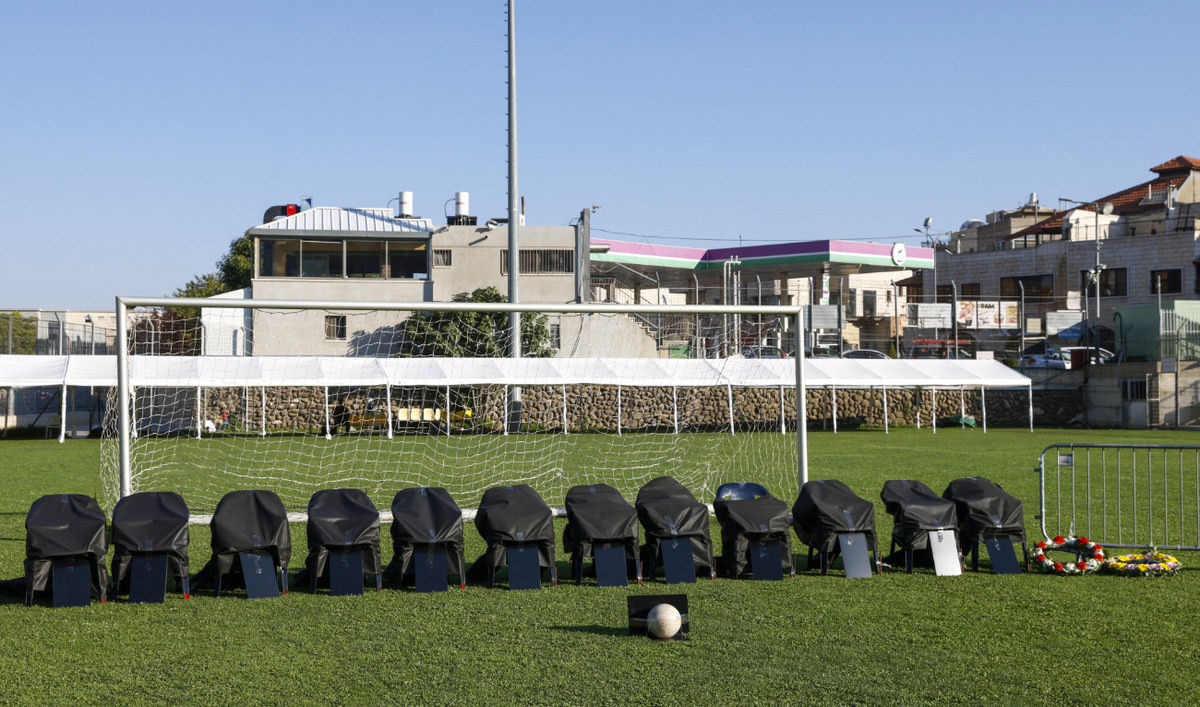
Chairs covered with black cloth, representing the 12 Druze killed in a rocket attack from Lebanon, line the football field where the attack took place during their funeral in Majdal Shams on July 28, 2024. (AFP)
The majority of Druze in the Golan identify as Syrian, but have resident status in Israel rather than as citizens. Members of the Druze community in Syria oppose the regime of Bashar al-Assad, which is supported by Hezbollah.
“The ‘cause of war’ is of great importance to Hezbollah,” said Michael A. Horowitz, a geopolitical analyst and chief analyst at Le Beck International.
“They will have to justify their actions against the Lebanese people (who will suffer heavy losses from Israel) if war breaks out as a result of the Majdal Shams attack, and this will be very difficult for them,”
“Hezbollah wants to be seen as the defender of Lebanon. If a war were to break out over an attack that killed residents of a town who did not even identify themselves as Israeli, it would be a terrible thing for the group.
“This helps explain Hezbollah’s denial of the conflict. Beyond the sectarian conflict, the story of how the war began is crucial for the group.”

